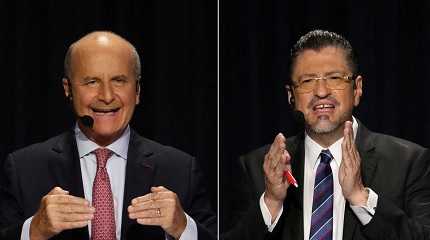
SAN JOSE, April 3 (Reuters) - Costa Ricans will choose a new president on Sunday to steer the Central American country through mounting debt woes and social discontent in a run-off between an anti-establishment outsider and former leader.
Final polling gave economist Rodrigo Chaves, a former longtime World Bank official, a slight lead over former President Jose Maria Figueres. Chaves had 41% of support, while Figueres was seen with 38%, with many voters still undecided, according to a poll by the University of Costa Rica published Tuesday.
Chaves, who also briefly served as finance minister for outgoing President Carlos Alvarado, came second in an initial vote in February. Seen as a renegade, he has vowed to shake up the ranks of the political elite, even pledging to use referendums to bypass Congress to bring change.
Figueres, whose father was also president for three separate terms, campaigned on his experience and family political legacy. He has promised to lift post-coronavirus pandemic economic growth and boost green industries in the environmentally progressive nation.
Going into the election, some voters said they were lukewarm on both candidates, whose political careers have been tainted by accusations of wrongdoings.
Chaves faced allegations of sexual harassment during his tenure at the World Bank, which he denied. Figueres resigned as executive director of the World Economic Forum in 2004 amid accusations in Costa Rica that he had influenced state contracts with the telecoms company Alcatel, a case that was never tried in court.
"I can't vote for Figueres or anything that looks like the PLN," said Olger Quesada, a vendor in San Jose, referring to the centrist National Liberation Party (PLN), which has often held power at national and local level over the past half-century. "I'm not excited about Chaves, but at least he's someone new."
Only 60% of eligible voters cast ballots in the first round, the lowest figure in decades. The margin between Chaves and Figueres, which has increasingly narrowed since Figueres led the first round, means undecided voters represent a key 18% piece of the pie that could sway the election in favor of either candidate.
"Chaves retains an edge due mostly to Figueres' relatively higher rejection rates and the weight that voters give his corruption allegations relative to Chaves' sexual harassment-related baggage," consultancy group Eurasia said in a note. "But the high level of undecided voters and very fluid voter preferences mean that Figueres could still pull out a win."
A new president will be tasked with managing Costa Rica's economy which plunged into its worst recession in 40 years due to the COVID-19 pandemic. About 23% of the country's population of 5.1 million live in poverty. A growing income disparity makes it one of the most unequal countries in the world and unemployment is running at almost 15%.
Costa Rica agreed in January 2021 to $1.78 billion in financial assistance from the International Monetary Fund. In return, the government said it would push through a raft of fiscal changes and austerity measures, but lawmakers have only passed a law to make savings on public sector workers benefits.
Polling centers open at 6 a.m. local time (1200 GMT) and will close at 6 p.m. (0000 GMT Monday). The first results are expected after 8 p.m. local time from the headquarters of the Supreme Electoral Tribunal.




